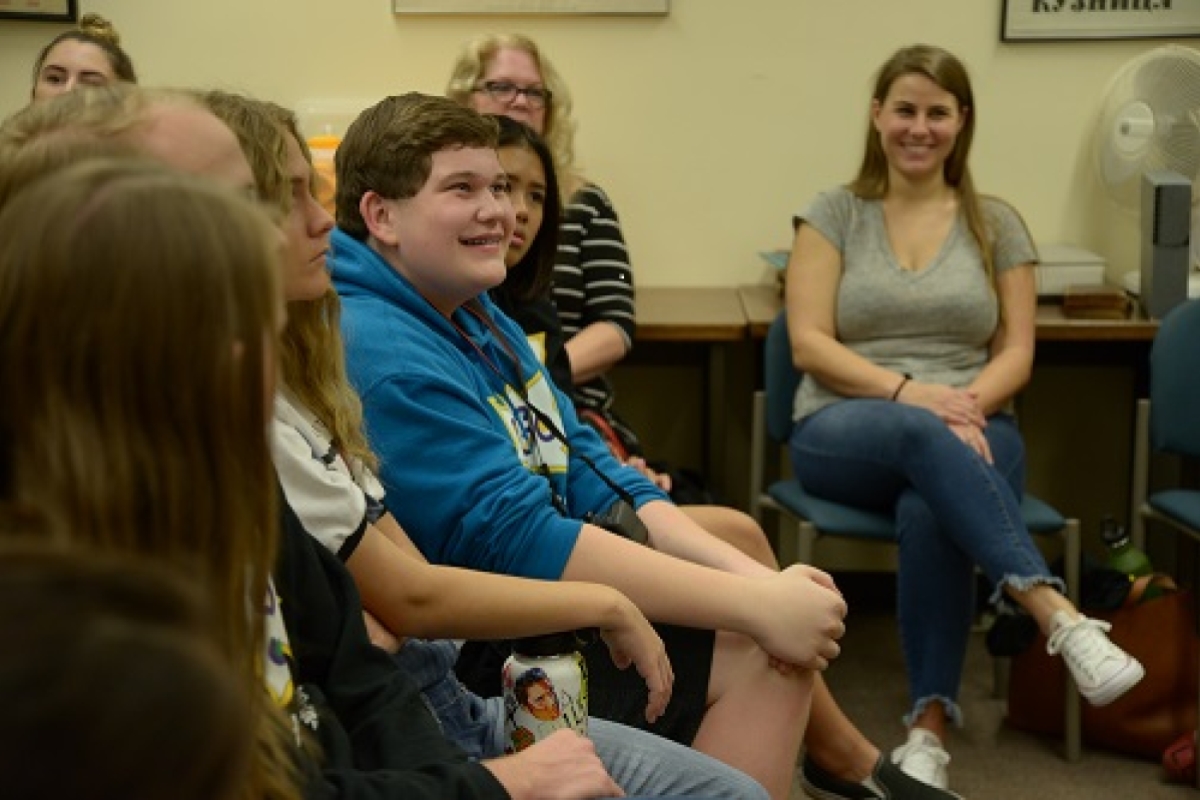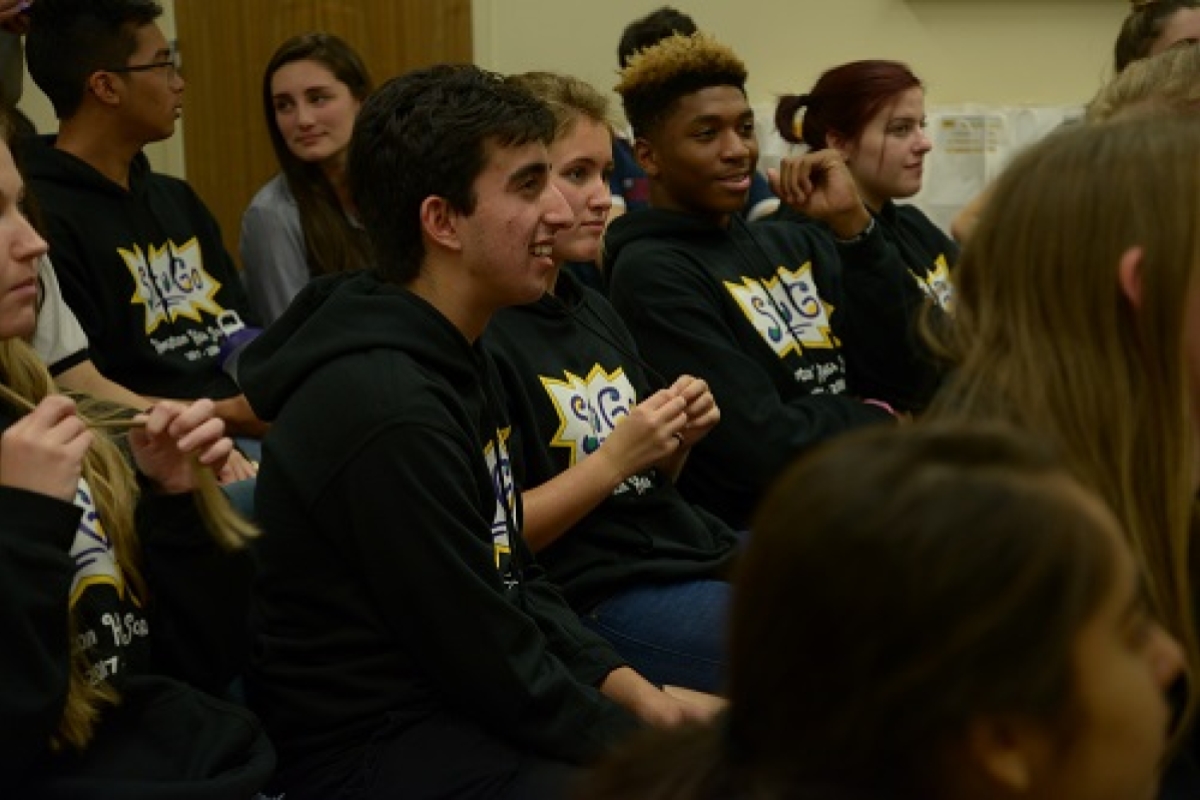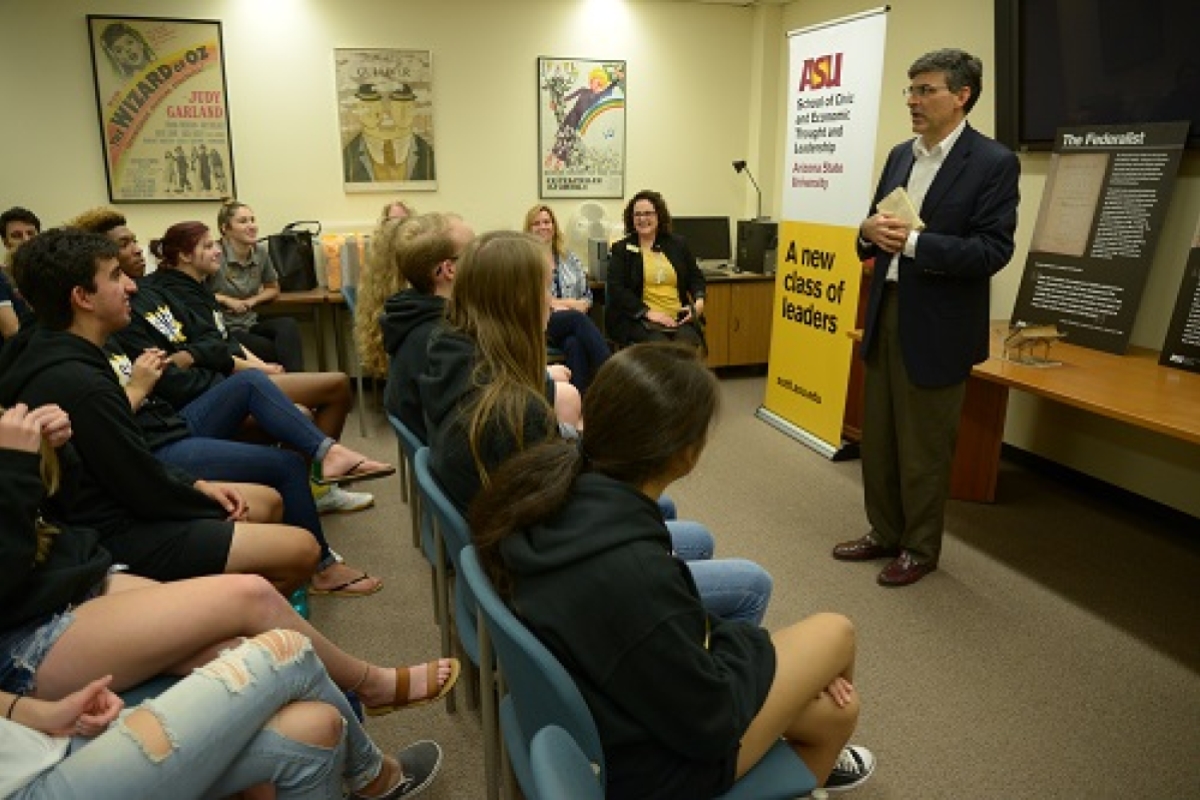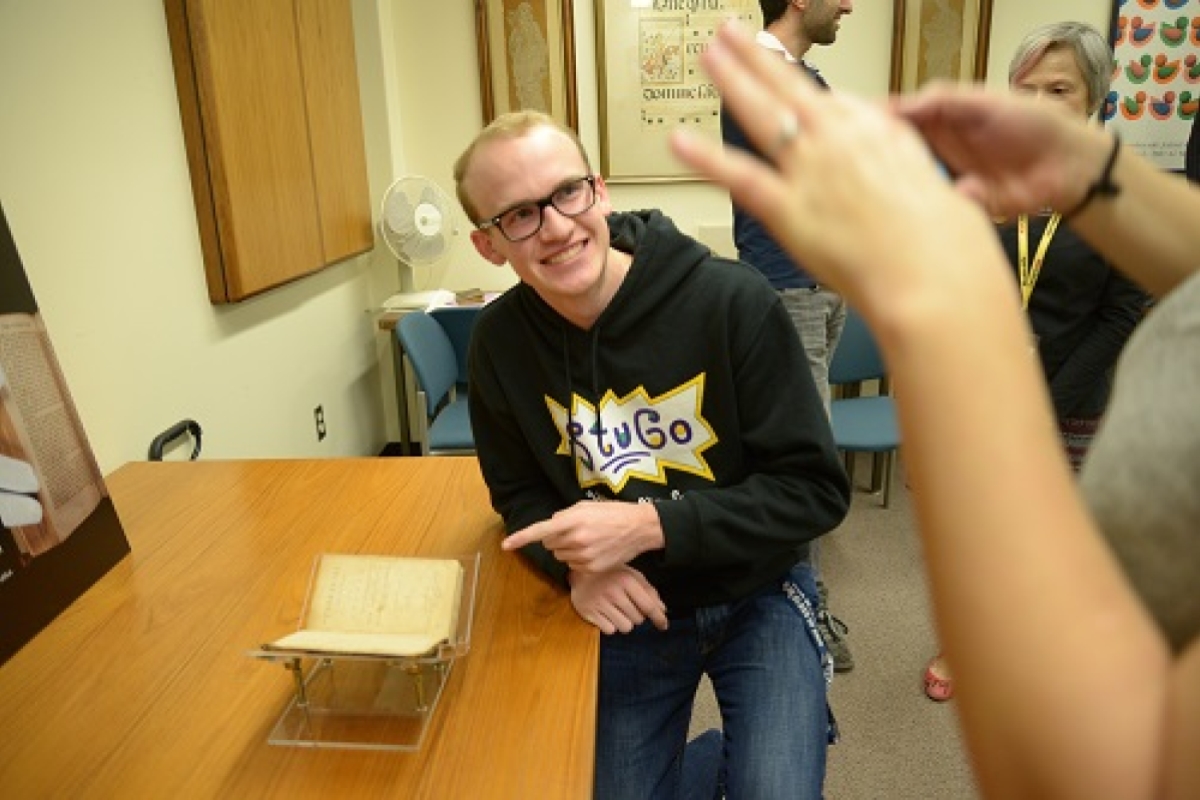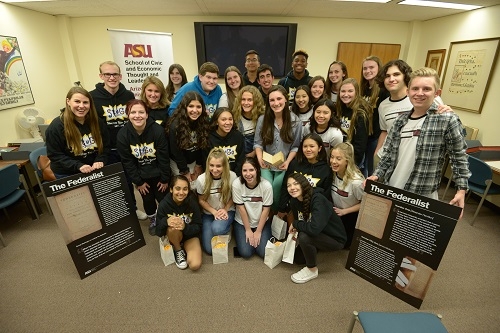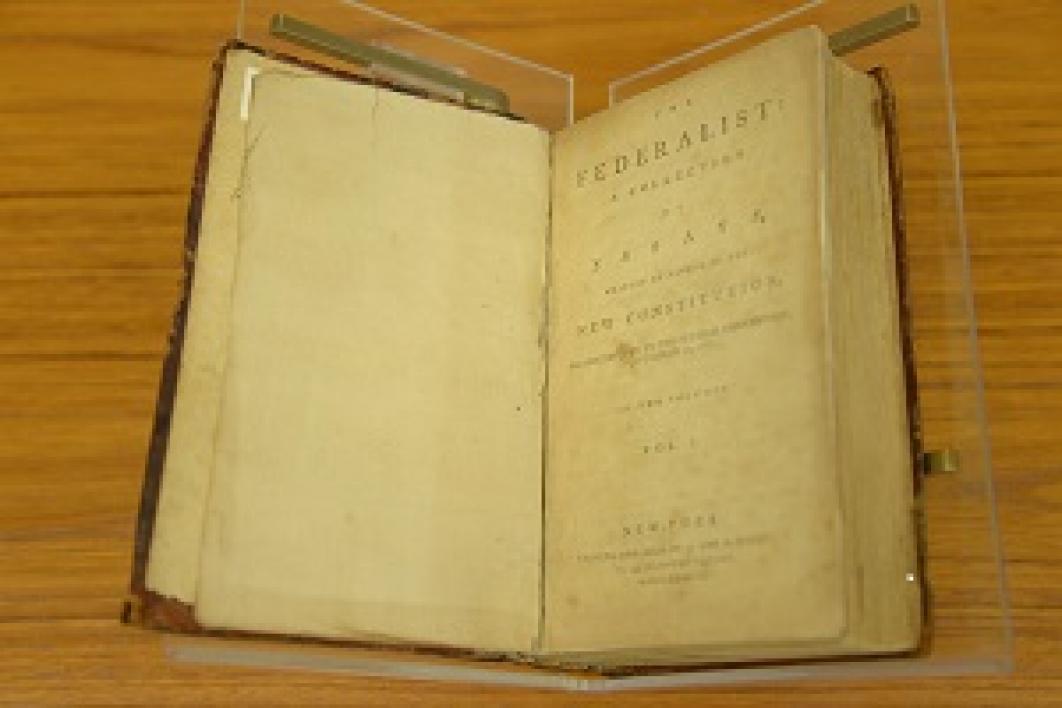Hamilton High School students visit ASU to talk leadership, higher ed, The Federalist
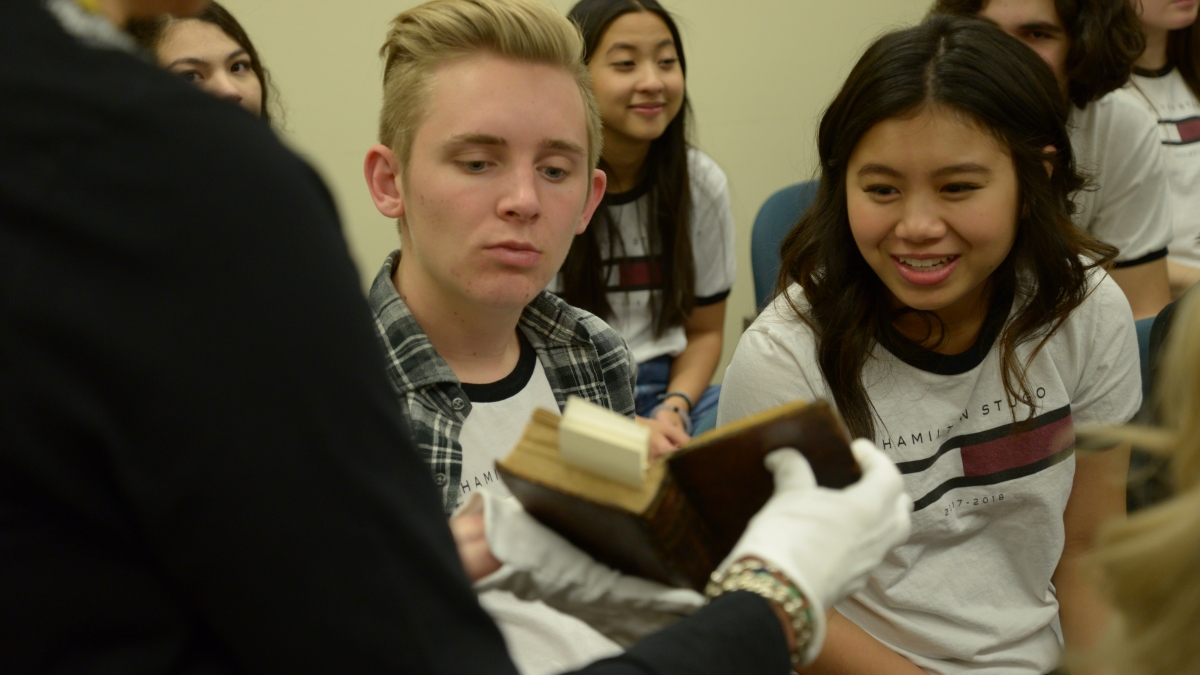
Students from Hamilton High School get up close with a first edition copy of The Federalist.
On Nov. 17, 30 members of student government from Hamilton High School in Chandler visited Arizona State University's Tempe campus for a full day of leadership education inspired by their teacher-sponsor, Violet Richard, and made possible by Access ASU.
After touring the campus, meeting with the Leadership Society and Changemaker Central, and exploring undergraduate student government opportunities, the students ended their trip in a small second-floor room in Hayden Library, where rare books librarian Katherine Krzys weaved through the tightly-packed chairs holding a small text opened to a brittle, yellowing title page.
The students were there for a close look at The Federalist, the collection of 85 essays penned by Alexander Hamilton, James Madison and John Jay to support the ratification of the U.S. Constitution. This isn’t just any version of The Federalist — it is a first edition copy, published in 1788 and one of the first 500 ever printed. Originally, it would have been cheaply and quickly distributed, and made accessible to the American public just before the U.S. Constitution was ratified.
The high school students, all elected members of leadership at Hamilton, range from 14- to 18-years-old and have grown up with access to entire libraries on devices barely thicker than credit cards. They can answer complex research questions in seconds with Google, and they can graduate high school and earn degrees without ever leaving their houses. When asked what dollar bill Alexander Hamilton appears on, no one could answer. They don’t really use paper money.
So what does a tattered, 230-year-old relic have to teach them, and why should they care? That is the question School of Civic and Economic Thought and Leadership Professor Zachary German set out to answer in his 20-minute session with the group.
"If Lin-Manuel Miranda can brilliantly compensate for my lack of ability to write and perform rap music, perhaps we can compensate for his lack of attention to The Federalist," German said.
He went on to quote Thomas Jefferson, who famously wrote in a letter to Virginia politician Thomas Mann Randolph: "Descending from theory to practice, there is no better book than The Federalist."
German focused on why The Federalist is relevant, and what we can learn from it. He emphasized lines from Federalist Paper No. 10, in which Madison acknowledges the responsibility of the government to protect citizens from unchecked power, writing, “Enlightened statesmen may not always be at the helm.”
When a student asked German which of the papers was his favorite, he quoted from Federalist Paper No. 37, in which Madison points out how difficult it is to arrive at a Constitution upon which all parties can agree. He explains that the framers’ priority was to establish a political structure that would function in spite of ideological differences, or rather, because of them, in the interest of establishing strong national character.
The Q&A session that followed ended with a question from junior representative Ryan Gentry, who asked, “How can we use lessons from The Federalist in our own community?”
The answer came from School of Civic and Economic Thought and Leadership Director Paul Carrese, who left the student government class with this final message: strong leadership demands civility, compromise, moderation and the establishment of common ground.
Later, commenting on the conversation and first edition text, Gentry said, "the tattered pages and the aura has plucked something down deep.” He called the symbolism of the book “really powerful” and something that “young people don’t often connect with.”
After the room cleared out, Krzys, who had guarded The Federalist as students stood with it to snap selfies and group photos, put on a pair of white art-handling gloves and prepared to return the rare book to the archive.
When asked to describe why these old books seem to resonate with students, she said that people get excited about going to back to original sources. She teaches a course on the history of books and said that her co-teacher says it best in his opening remarks to the class.
“100 years from now,” Krzys said, quoting her colleague, “we will know more about the Renaissance than we will about the last 100 years. Everything is so ephemeral now.”
She said that old books matter in part because they have survived, and that alone is a testimony to their value.
The School of Civic and Economic Thought and Leadership, an academic unit in the College of Liberal Arts and Sciences, has plans to use The Federalist and other rare texts in events supporting a Great Books program, in which students study works of important political, economic and civic thought, in preparation to become engaged leaders in both government and the private sector. The Federalist will be on display during the 2018 tour of "Hamilton" at ASU Gammage, where thousands of people in the community will have the opportunity to see and learn more about the text and its role in U.S. history.
To arrange a viewing of The Federalist, or to coordinate a presentation of other archived materials, contact the Luhrs Reading Room at archives@asu.edu.
More Law, journalism and politics

Exhibit uses rare memorabilia to illustrate evolution of US presidential campaigns
After one of the most contentious elections in history, a new museum exhibit offers a historical perspective on the centuries-old…

TechTainment conference explores the crossroads of law, technology, entertainment
What protections do writers, actors, producers and others have from AI? Will changing laws around name, image and likeness (…

How to watch an election
Every election night, adrenaline pumps through newsrooms across the country as journalists take the pulse of democracy. We…
